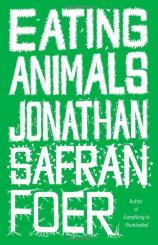Reading Group Guide
Discussion Questions
Eating Animals

1. Conversations about eating animals --- and the reasons behind the decisions we make --- can be polarizing and often alienating. In “All or Nothing or Something Else,” Jonathan Safran Foer writes, “We need a better way to talk about eating animals. We need a way that brings meat to the center of public discussion in the same way it is often at the center of our plates” (page 33). What does Foer mean by this? Do you agree with him?
2. Why do you think that something as essential as what we put in our bodies is so often disregarded or not thought through carefully? What is the potential convenience of such nonchalance and what problems can it lead to?
3. What are some of the challenges of being a vegan or a vegetarian? Does where you live matter? To what extent do you think economics play into the decision of eating responsibly or of supporting local farms?
4. We have so many food choices available to us now. Is this, in your opinion, a blessing or a curse?
5. We sometimes hear in the media about the inhumane treatment of animals in factory farms and about the unhealthy --- and sometimes fatal --- consequences that such treatment can have for us. In your opinion, how do books such as Eating Animals, The Omnivore’s Dilemma by Michael Pollan, and Animal, Vegetable, Miracle by Barbara Kingsolver, or documentaries like Food, Inc., differ from “breaking news” stories and exposés? Why are both modes of information important and how do they contribute to the conversation in different ways? Is one more lasting than the other? If so, explain why.
6. Were there any facts cited in Eating Animals that shocked you? If so, what were they?
7. At what point do you think awareness of factory farming will be sufficiently raised in the public eye? Do you think that if people have enough information they’ll stop buying factory-farmed meat?
8. Foer’s relationship with eating is grounded in his memories of meals shared with his grandmother and the stories she told about food. Even when she was on the run from Nazis and starving, she would not eat pork. “If nothing matters, there’s nothing to save,” she tells Foer and his brothers (page 17). Foer concludes Eating Animals with the same thought, after more than twenty years of his own experiences informing his choices about food. Discuss the signifi cance of this sentiment and how its implications can fi nd universal resonance.
9. How do you feel about making food choices for other people? Discuss Foer’s decision to raise his children as vegetarians before they are old enough to understand the ethical reasons behind such a lifestyle. Would you ever make a similar choice?
10. Discuss the aspects of Eating Animals that you found to be controversial, if any. Were they helpful in opening a dialogue on the subject? Why or why not? Have any of your eating habits changed since reading this book?
Eating Animals
- Publication Date: November 2, 2009
- Hardcover: 352 pages
- Publisher: Little, Brown and Company
- ISBN-10: 0316069906
- ISBN-13: 9780316069908








